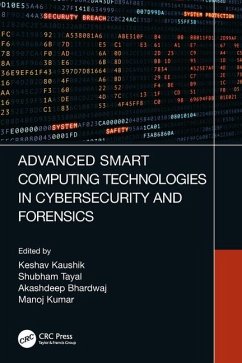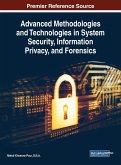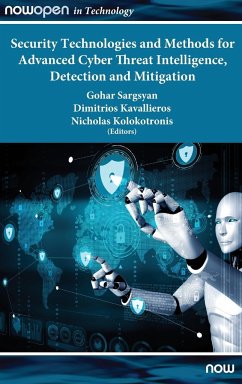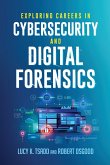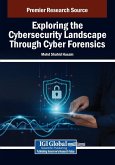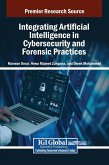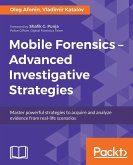Advanced Smart Computing Technologies in Cybersecurity and Forensics
Herausgeber: Kaushik, Keshav; Bhardwaj, Akashdeep; Tayal, Shubham
Advanced Smart Computing Technologies in Cybersecurity and Forensics
Herausgeber: Kaushik, Keshav; Bhardwaj, Akashdeep; Tayal, Shubham
- Broschiertes Buch
- Merkliste
- Auf die Merkliste
- Bewerten Bewerten
- Teilen
- Produkt teilen
- Produkterinnerung
- Produkterinnerung
This book addresses the topics related to artificial intelligence, internet of things, blockchain technology, and machine learning and bring together researchers, developers, practitioners, and users who are interested in cybersecurity and forensics.
Andere Kunden interessierten sich auch für
![Advanced Methodologies and Technologies in System Security, Information Privacy, and Forensics Advanced Methodologies and Technologies in System Security, Information Privacy, and Forensics]() Advanced Methodologies and Technologies in System Security, Information Privacy, and Forensics261,99 €
Advanced Methodologies and Technologies in System Security, Information Privacy, and Forensics261,99 €![Security Technologies and Methods for Advanced Cyber Threat Intelligence, Detection and Mitigation Security Technologies and Methods for Advanced Cyber Threat Intelligence, Detection and Mitigation]() Security Technologies and Methods for Advanced Cyber Threat Intelligence, Detection and Mitigation116,99 €
Security Technologies and Methods for Advanced Cyber Threat Intelligence, Detection and Mitigation116,99 €![Exploring the Cybersecurity Landscape Through Cyber Forensics Exploring the Cybersecurity Landscape Through Cyber Forensics]() Mohd Shahid HusainExploring the Cybersecurity Landscape Through Cyber Forensics210,99 €
Mohd Shahid HusainExploring the Cybersecurity Landscape Through Cyber Forensics210,99 €![Exploring Careers in Cybersecurity and Digital Forensics Exploring Careers in Cybersecurity and Digital Forensics]() Lucy TsadoExploring Careers in Cybersecurity and Digital Forensics24,99 €
Lucy TsadoExploring Careers in Cybersecurity and Digital Forensics24,99 €![Exploring the Cybersecurity Landscape Through Cyber Forensics Exploring the Cybersecurity Landscape Through Cyber Forensics]() Mohd Shahid HusainExploring the Cybersecurity Landscape Through Cyber Forensics160,99 €
Mohd Shahid HusainExploring the Cybersecurity Landscape Through Cyber Forensics160,99 €![Integrating Artificial Intelligence in Cybersecurity and Forensic Practices Integrating Artificial Intelligence in Cybersecurity and Forensic Practices]() Integrating Artificial Intelligence in Cybersecurity and Forensic Practices253,99 €
Integrating Artificial Intelligence in Cybersecurity and Forensic Practices253,99 €![Mobile Forensics - Advanced Investigative Strategies Mobile Forensics - Advanced Investigative Strategies]() Oleg AfoninMobile Forensics - Advanced Investigative Strategies54,99 €
Oleg AfoninMobile Forensics - Advanced Investigative Strategies54,99 €-
-
-
This book addresses the topics related to artificial intelligence, internet of things, blockchain technology, and machine learning and bring together researchers, developers, practitioners, and users who are interested in cybersecurity and forensics.
Produktdetails
- Produktdetails
- Verlag: CRC Press
- Seitenzahl: 260
- Erscheinungstermin: 29. Januar 2024
- Englisch
- Abmessung: 234mm x 156mm x 14mm
- Gewicht: 401g
- ISBN-13: 9780367690137
- ISBN-10: 0367690136
- Artikelnr.: 69904426
- Herstellerkennzeichnung
- Libri GmbH
- Europaallee 1
- 36244 Bad Hersfeld
- gpsr@libri.de
- Verlag: CRC Press
- Seitenzahl: 260
- Erscheinungstermin: 29. Januar 2024
- Englisch
- Abmessung: 234mm x 156mm x 14mm
- Gewicht: 401g
- ISBN-13: 9780367690137
- ISBN-10: 0367690136
- Artikelnr.: 69904426
- Herstellerkennzeichnung
- Libri GmbH
- Europaallee 1
- 36244 Bad Hersfeld
- gpsr@libri.de
Prof. Keshav Kaushik is Assistant Professor in the Department of Systemics, School of Computer Science at the University of Petroleum and Energy Studies, Dehradun, India. Dr. Shubham Tayal is Assistant Professor at SR University, Warangal. Dr. Akashdeep Bhardwaj is Professor (Cyber Security & Digital Forensics) at the University of Petroleum & Energy Studies (UPES), Dehradun, India. Dr. Manoj Kumar is Assistant Professor (SG) (SoCS) at the University of Petroleum and Energy Studies, Dehradun.
1. Detection of Cross-Site Scripting and Phishing Website Vulnerabilities
Using Machine Learning.
2. A Review: Security and Privacy Defensive Techniques for Cyber Security
Using Deep Neural Networks (DNNs).
3. DNA-Based Cryptosystem for Connected Objects and IoT Security.
4. A Role of Digital Evidence: Mobile Forensics Data.
5. Analysis of Kernel Vulnerabilities Using Machine Learning.
6. Cyber Threat Exploitation and Growth during COVID-19 Times.
7. An Overview of the Cybersecurity in Smart Cities in the Modern Digital
Age.
8. The Fundamentals and Potential for Cyber Security of Machine Learning in
the Modern World.
9. Qualitative and Quantitative Evaluation of Encryption Algorithms.
10. Analysis and Investigation of Advanced Malware Forensics.
11. Network Intrusion Detection System Using Naïve Bayes Classification
Technique for Anomaly Detection.
12. Data Security Analysis in Mobile Cloud Computing for Cyber Security.
13. A Comprehensive Review of Investigations of Suspects of Cyber Crimes.
14. Fault Analysis Techniques in Lightweight Ciphers for IoT Devices.
Using Machine Learning.
2. A Review: Security and Privacy Defensive Techniques for Cyber Security
Using Deep Neural Networks (DNNs).
3. DNA-Based Cryptosystem for Connected Objects and IoT Security.
4. A Role of Digital Evidence: Mobile Forensics Data.
5. Analysis of Kernel Vulnerabilities Using Machine Learning.
6. Cyber Threat Exploitation and Growth during COVID-19 Times.
7. An Overview of the Cybersecurity in Smart Cities in the Modern Digital
Age.
8. The Fundamentals and Potential for Cyber Security of Machine Learning in
the Modern World.
9. Qualitative and Quantitative Evaluation of Encryption Algorithms.
10. Analysis and Investigation of Advanced Malware Forensics.
11. Network Intrusion Detection System Using Naïve Bayes Classification
Technique for Anomaly Detection.
12. Data Security Analysis in Mobile Cloud Computing for Cyber Security.
13. A Comprehensive Review of Investigations of Suspects of Cyber Crimes.
14. Fault Analysis Techniques in Lightweight Ciphers for IoT Devices.
1. Detection of Cross-Site Scripting and Phishing Website Vulnerabilities
Using Machine Learning.
2. A Review: Security and Privacy Defensive Techniques for Cyber Security
Using Deep Neural Networks (DNNs).
3. DNA-Based Cryptosystem for Connected Objects and IoT Security.
4. A Role of Digital Evidence: Mobile Forensics Data.
5. Analysis of Kernel Vulnerabilities Using Machine Learning.
6. Cyber Threat Exploitation and Growth during COVID-19 Times.
7. An Overview of the Cybersecurity in Smart Cities in the Modern Digital
Age.
8. The Fundamentals and Potential for Cyber Security of Machine Learning in
the Modern World.
9. Qualitative and Quantitative Evaluation of Encryption Algorithms.
10. Analysis and Investigation of Advanced Malware Forensics.
11. Network Intrusion Detection System Using Naïve Bayes Classification
Technique for Anomaly Detection.
12. Data Security Analysis in Mobile Cloud Computing for Cyber Security.
13. A Comprehensive Review of Investigations of Suspects of Cyber Crimes.
14. Fault Analysis Techniques in Lightweight Ciphers for IoT Devices.
Using Machine Learning.
2. A Review: Security and Privacy Defensive Techniques for Cyber Security
Using Deep Neural Networks (DNNs).
3. DNA-Based Cryptosystem for Connected Objects and IoT Security.
4. A Role of Digital Evidence: Mobile Forensics Data.
5. Analysis of Kernel Vulnerabilities Using Machine Learning.
6. Cyber Threat Exploitation and Growth during COVID-19 Times.
7. An Overview of the Cybersecurity in Smart Cities in the Modern Digital
Age.
8. The Fundamentals and Potential for Cyber Security of Machine Learning in
the Modern World.
9. Qualitative and Quantitative Evaluation of Encryption Algorithms.
10. Analysis and Investigation of Advanced Malware Forensics.
11. Network Intrusion Detection System Using Naïve Bayes Classification
Technique for Anomaly Detection.
12. Data Security Analysis in Mobile Cloud Computing for Cyber Security.
13. A Comprehensive Review of Investigations of Suspects of Cyber Crimes.
14. Fault Analysis Techniques in Lightweight Ciphers for IoT Devices.

